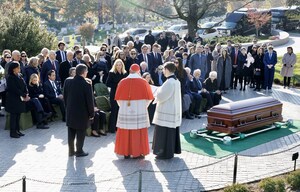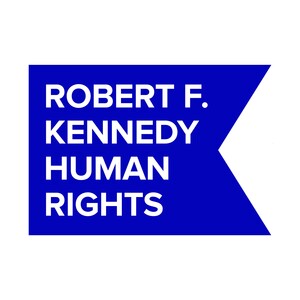Honduran President Iris Xiomara Castro Sarmiento joined the event by video conference, who committed to complying with the reparations.
Many activists wore white, in honor of women's rights. Others carried signs pleading for justice, and noting there have been more than 400 LGBTQ + deaths in the country since Vicky was killed in 2009.
"I grew up in a devout Catholic family, and we were taught, as all major religions teach, that there are steps the perpetrator must take to forgiveness. They must acknowledge a wrong has been done, take responsibility for the wrong, and they must apologize. So today, the Government of Honduras has taken the first steps by publicly acknowledging and taking responsibility and apologizing for murdering Vicky. But the last step is absolutely crucial. That is making reparations. And until those reparations are made, this apology is not sufficient, in law or in spirit," said Kerry Kennedy, president of Robert F. Kennedy Human Rights. "We are grateful to President Castro for her public statement of commitment to making these necessary reforms."
RFK Human Rights and its co-counsel, Red Lésbica Cattrachas, litigated Vicky's case before the Inter-American Court of Human Rights in 2020, arguing that Vicky was extrajudicially executed—killed by the Honduran state without any legal process—because of a highly discriminatory culture against trans people in Honduras. In 2021, the Court made a landmark ruling holding Honduras accountable for Vicky's death and issued a series of reparations, including financial support for Vicky's family, that set a legal precedent for LGBTQ+ rights throughout the region.
"We should love our children for who they are because they come from the womb," Rosa Hernández, Vicky Hernández's mother said. "No one has a right to take a life."
As part of its verdict, the court ordered Honduras to implement a range of measures designed to protect trans people, including anti-discrimination training for security forces and improved data collection on cases motivated by anti-LGBT bias. The court also ruled that the state must allow people to change their name and gender identity on identification documents and public records.
"There has been a precipitous decline in democracy and human rights in the region," said Angelita Baeyens, VP of International Advocacy and Litigation at RFK Human Rights and one of the lead litigators on the case. "Instituting these mandated reparations will provide a ray of hope. It is vital to have a roadmap in place to protect LGBTIᐩ individuals in Honduras, throughout Latin America, and in the rest of the world. It's long past time to publicly reaffirm Vicky's legacy – the fundamental principle that nobody should be discriminated against for determining for themselves who they are and how they identify in the most essential aspects of their being."
For more information on Vicky's case, visit https://rfkhumanrights.org/the-historic-case-of-vicky-hern%C3%A1ndez-et-al-v-honduras.
Photos and videos from the Act of Recognition of Responsibility ceremony are available upon request.
SOURCE Robert F. Kennedy Human Rights








Share this article